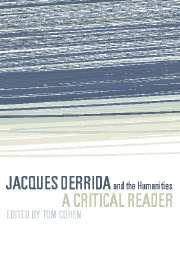Book contents
- Frontmatter
- Contents
- Preface
- Acknowledgements
- Biographical chronology
- Introduction: Derrida and the future of …
- Chapter 1 The future of the profession or the university without condition (thanks to the “Humanities,” what could take place tomorrow)
- Chapter 2 Derrida and literature
- Chapter 3 Derrida and gender: the other sexual difference
- Chapter 4 Derrida and aesthetics: Lemming (reframing the abyss)
- Chapter 5 Derrida and representation: mimesis, presentation, and representation
- Chapter 6 Derrida and philosophy: acts of engagement
- Chapter 7 Derrida and ethics: hospitable thought
- Chapter 8 Derrida and politics
- Chapter 9 Derrida and law: legitimate fictions
- Chapter 10 Derrida and technology: fidelity at the limits of deconstruction and the prosthesis of faith
- Chapter 11 Derrida and history: some questions Derrida pursues in his early writings
- Chapter 12 Derrida and psychoanalysis: desistantial psychoanalysis
- Glossary
- Index
Preface
Published online by Cambridge University Press: 22 September 2009
- Frontmatter
- Contents
- Preface
- Acknowledgements
- Biographical chronology
- Introduction: Derrida and the future of …
- Chapter 1 The future of the profession or the university without condition (thanks to the “Humanities,” what could take place tomorrow)
- Chapter 2 Derrida and literature
- Chapter 3 Derrida and gender: the other sexual difference
- Chapter 4 Derrida and aesthetics: Lemming (reframing the abyss)
- Chapter 5 Derrida and representation: mimesis, presentation, and representation
- Chapter 6 Derrida and philosophy: acts of engagement
- Chapter 7 Derrida and ethics: hospitable thought
- Chapter 8 Derrida and politics
- Chapter 9 Derrida and law: legitimate fictions
- Chapter 10 Derrida and technology: fidelity at the limits of deconstruction and the prosthesis of faith
- Chapter 11 Derrida and history: some questions Derrida pursues in his early writings
- Chapter 12 Derrida and psychoanalysis: desistantial psychoanalysis
- Glossary
- Index
Summary
The present volume may be the first overtly trans-disciplinary “reader” devoted to Derrida's work in its current phase. These essays were not only to be “pedagogic” in demonstrating one or more ways to read Derrida's extensions into these fields. They were called together to ask again why or how, “today,” Derrida's interventions are to be tracked, and what the consequences of this project stand, perhaps, to be in the institutions of the human sciences or a “Humanities” to come.
Three premises, therefore, underlie the essays gathered here:
That Derrida's work, “today,” might be tracked by its interface with a series of different “disciplines,” different questions, to make connections for the reader as to how these might work or are underway in scholarship or thinking today: thus, for the first time, a volume in which the somewhat formal questions of Derrida and Law, … and Literature, … and Aesthetics, … and Politics, … and Psychoanalysis, … and Ethics, … and Technology, … and Representation, and so on, might be addressed as pretexts for more or less exemplary exploration;
That these essays, virtually or otherwise, would concern themselves less with the polemical contexts of Derrida's past reception - distracting misprisions of “nihilism” or “relativism” or “linguisticism,” and so on – than demonstrate by interrogation and performance the “affirmative deconstruction” that Derrida has, from the first, insisted was the necessarily transformative premise of his thought;
That these essays might have access to more recent work of Derrida's, or developments which bring into play texts and perspectives (for instance, on hospitality and religion, technicity and the “secret”) either unavailable to or unemphasized in earlier treatments of this text.
- Type
- Chapter
- Information
- Jacques Derrida and the HumanitiesA Critical Reader, pp. ix - xPublisher: Cambridge University PressPrint publication year: 2002

